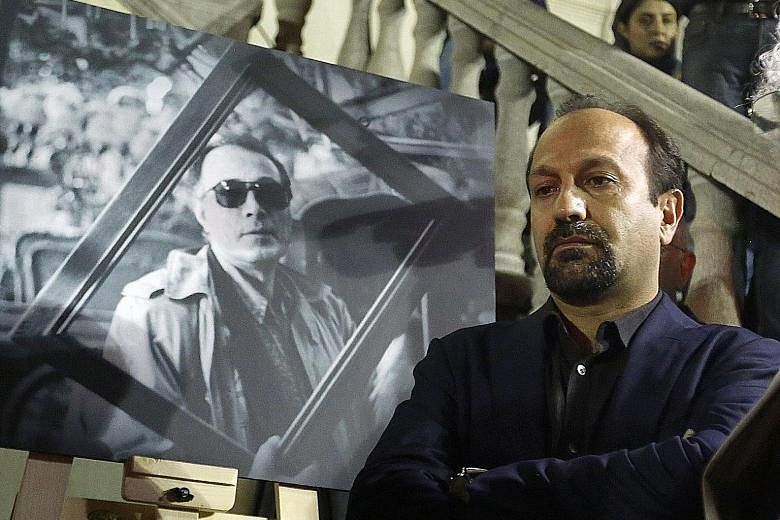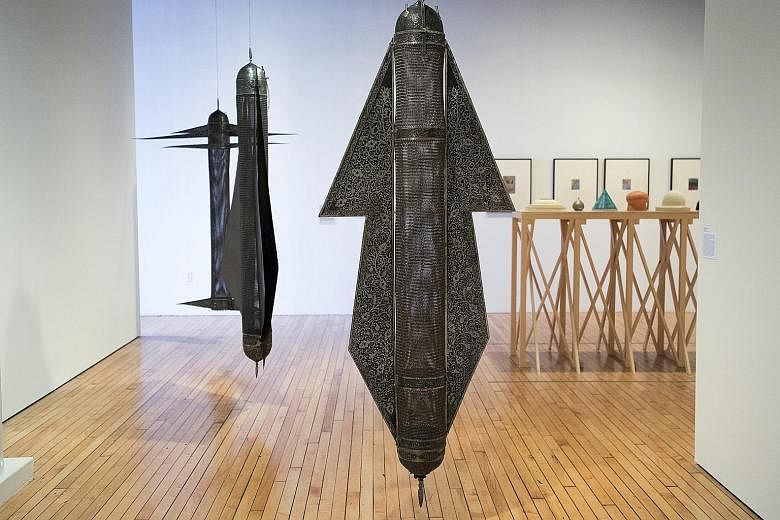PARIS• The Iranian director of The Salesman, which is nominated for an Academy Award for Best Foreign Language Film, will not attend next month's Oscars ceremony.
New York's Metropolitan Museum of Art worries that exhibitions, archaeological surveys and excavations with institutions in the Middle East will have to be cancelled or curtailed.
And the Sundance Institute Theater Program may have to scale back its exchange programme with artists from the Middle East and North Africa.
As United States President Donald Trump's executive order seeking to keep many foreigners from entering the US sowed widespread confusion throughout the immigration system and at airports around the globe, cultural figures and institutions were calculating how the new policies would harm their art and missions.
"Scholarly exchanges and international collaborations are key to our ongoing work and we are very concerned that a number of programmes we have in place could be threatened, just at a time when the world needs more, not less, exchange and mutual understanding," said Mr Thomas P. Campbell, director of the Metropolitan Museum of Art.
The executive order, which was signed by Mr Trump last Friday, blocks entry into the US for 90 days for citizens of seven predominantly Muslim countries: Iran, Iraq, Libya, Somalia, Sudan, Syria and Yemen.
It also suspends entry of all refugees for 120 days and bars Syrian refugees indefinitely. Artists - and citizens - from the affected countries legally residing in the US said they did not dare to leave for fear of being denied re-entry.
In the most high-profile case, Asghar Farhadi, who directed The Salesman, said in a statement on Sunday to The New York Times that he would not attend the Oscars ceremony next month even if he were granted an exemption to the visa ban.
He had planned to attend the ceremony on Feb 26 and to use the megaphone the Oscars provides to call attention to a visa ban he called "unjust". But new regulations announced last Friday presented "ifs and buts which are in no way acceptable to me even if exceptions were to be made for my trip", he said.
In his statement, Farhadi, whose film A Separation won an Oscar for Best Foreign Language Film in 2012, said he condemned "the unjust conditions forced upon some of my compatriots and the citizens of the other six countries trying to legally enter the United States of America and hope that the current situation will not give rise to further divide between nations".
His film centres on a Teheran couple starring in an amateur production of Arthur Miller's Death Of A Salesman and includes subtle critiques of censorship in Iran. The film's screenplay had to be approved by the Iranian government, which also chose the film as the country's official submission to the Academy Awards.
Marcel Mettelsiefen, director of Watani: My Homeland, an Oscar-nominated documentary, said the film's Syrian protagonist, Hala Kamil, would not be able to travel to the Oscars ceremony because she has a Syrian and a German refugee passport.
The film follows Kamil and her children as they seek asylum in Germany. "It is very sad she cannot come," Mettelsiefen said. "She is the star of the movie."
Kamil has been a frequent visitor to the US, even giving a speech on the plight of refugees at the United Nations in August.
Philip Himberg, artistic director of the Sundance Institute Theater Program, said he feared the visa ban would shut down a fruitful workshop exchange for theatre professionals from the Middle East and North Africa.
Since it started in 2012, about 60 Arabic-language professionals have attended the workshops in Utah, Wyoming, Berlin and Morocco.
"It shatters my heart," Himberg said. He added that the programme was supported by a grant from the Doris Duke Charitable Trust and the Sundance Institute did not know what would happen if the artists the grant was intended to bring to the US could no longer travel there.
The ban is also expected to affect museums. Curators at the Metropolitan Museum of Art said the order could disrupt or limit its loans to and from the affected countries and would restrict travel by colleagues and artists to the US for education, research, fellowships, workshops, conferences and other training.
They said it might also scuttle their hoped-for archaeological surveys and excavations in partnership with Iraq and Iran, and a joint publication project on Nishapur with Iran.
Mr Trump's move is "particularly ironic, given that the earliest formulation of what we recognise today as the concept of habeas corpus was expressed in the Codex Hammurabi, an ancient Iraqi monument about justice, set up in public so that all citizens could access their rights", said Ms Kim Benzel, the curator in charge of the museum's Department of Ancient Near Eastern Art.
"It was one of the many contributions of Iraq to the world and, in this case, to democracy itself," she added. "Where and how did things go so wrong?"
Lawyers are struggling to understand what the visa ban means. "There's a lot in here that is subject to interpretation," said Mr Jonathan Ginsburg, an immigration lawyer in Virginia who specialises in visas for artists and performers.
He said the language made clear that nationals from the seven countries "appear to be banned for 90 days, even if they have applied for and received a US visa".
He added: "The flip side is that we may not appreciate just how broadly worded these things are until someone decides to interpret them more aggressively."
For now, many artists from affected countries who are legal residents in the US say they cannot leave the country for fear of not being able to return.
Shahpour Pouyan, an Iranian artist living in New York under a green card whose work is at the Metropolitan Museum of Art, said he would be unable to travel to Toronto for a group exhibit or to Paris for a solo exhibition in March.
"I am stuck here. I can't leave the country and as an artist it means I can't make shows and present my works internationally," he wrote in an e-mail message. "This is such a mess."
NYTIMES


